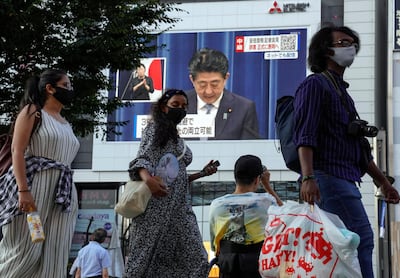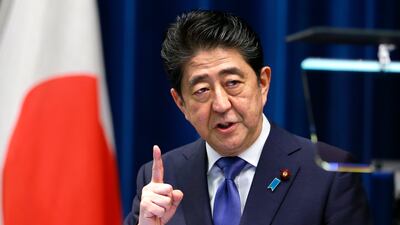Japan’s former prime minister, Shinzo Abe, who was shot and killed on Friday at the age of 67, was the longest-serving premier of Japan, known for his conservative agenda of restoring his country’s economy, military and national pride.
Abe, the grandson of another former prime minister, was elected to parliament in 1993 after the death of his father, a former foreign minister.
Born in Tokyo on September 21, 1954, Abe belonged to a prominent political family with significant economic influence throughout Japan in the period before and after the Second World War.
He attended Seikei Elementary School and Seikei Junior and Senior High School before studying public administration and graduating with a bachelor's degree in political science from Seikei University in 1977.
Abe was 52 years old when he first became prime minister in 2006, becoming the youngest person to take on the top role in the post-war era. His first term was turbulent, plagued by scandals and discord and capped by an abrupt resignation more than a year later.
After initially suggesting he was stepping down for political reasons, he acknowledged he was suffering an ailment later diagnosed as ulcerative colitis.
The debilitating bowel condition required months of treatment but was, according to Abe, eventually overcome with the help of new medication.
He would run again, and Japan's revolving prime ministerial door brought him back to office in 2012.
It ended a turbulent period in which prime ministers changed frequently, sometimes at the rate of one a year.
With Japan still staggering from the effects of the 2011 tsunami and subsequent nuclear disaster at Fukushima ― and a brief opposition government criticised for flip-flopping and incompetence ― Abe offered a seemingly safe pair of hands.
And he had a plan: Abenomics.
‘Abenomics’
The scheme to revive Japan's economy ― the world's third-biggest, but more than two decades into stagnation ― involved vast government spending, huge monetary easing and cutting red tape.
Abe also sought to boost the country's flagging birth rate by making workplaces more friendly to parents, particularly mothers.

He pushed through controversial consumption tax increases to help finance nurseries and plug gaps in Japan's overstretched social security system.
Abe's star waned further during the Covid pandemic, with his approach criticised as confused and slow, driving his approval ratings down to some of the lowest of his tenure.
Close relationship with Trump
On the international stage, Abe took a hard line on North Korea, but sought a peacemaker role between the United States and Iran.
He prioritised a close personal relationship with Donald Trump in an attempt to protect Japan's key alliance from the US president's "America First" mantra, and tried to mend ties with Russia and China.
But the results were mixed: Mr Trump was eager to force Japan to pay more for US troops stationed in the country, a deal with Russia on disputed northern islands stayed elusive and a plan to invite Xi Jinping for a state visit fell by the wayside.

Abe also pursued a hard line with South Korea over unresolved wartime disputes and continued to float plans to revise Japan's pacifist constitution.
Throughout his tenure, he weathered political storms including cronyism allegations that dented approval ratings but did little to affect his power, in part thanks to the weakness of the opposition.
Abe had been due to stay on until late 2021, giving him an opportunity to see out one final event in his historic tenure — the postponed Tokyo 2020 Olympic Games.
But in a shock announcement, he stepped down in August 2020, with a recurrence of ulcerative colitis ending his second term too.
Pivotal partner in the Middle East
Abe’s last visit to the Middle East was in 2020, shortly before his resignation, when he met the leaders of Saudi Arabia, the UAE and Oman in an attempt to “help stabilise the region”, a week after the US killed top Iranian general Qassem Suleimani in Baghdad.

During Abe's visit to the UAE, he met Sheikh Mohamed bin Zayed who at the time was Crown Prince of Abu Dhabi and Deputy Supreme Commander of the Armed Forces.
"This is the fourth time I have visited the UAE and met with Sheikh Mohamed bin Zayed. The UAE plays a key and pivotal role in pursuing sustainable development, peace and stability in the Middle East," Abe said at the time.


